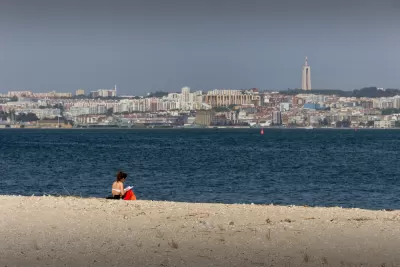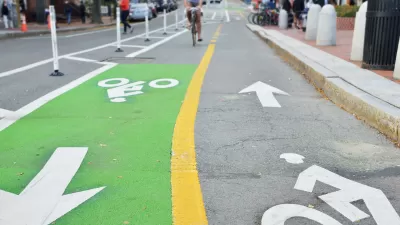As the library of books on urbanism expands by the year, here are some fun, engaging titles for city nerds and non-nerds alike.

Last weekend at the Lincoln Institute of Land Policy's annual Journalists Forum, we learned more about cities, infrastructure, and land use in two days than most people learn in a lifetime. Fittingly, the Lincoln Institute is around the corner from Harvard University and a mile or so away from MIT. It’s an environment ripe for the transmission of wisdom.
Of course, not everyone can dedicate an entire weekend to learning about cities. In some sense, we don’t need to. The vast majority of Americans, and an increasing share of the world’s population—50 percent and rising—live in urban areas. We are all experts by experience.
And yet, a rich scholarly and journalistic tradition—propagated by many of my colleagues at this weekend’s conference—surrounds cities: their economies, cultures, physical environments, and demographics. And, just as a visit to Paris or Tokyo, or even Des Moines or Doha, can be breathtaking to the curious visitor, so can many books be to the eager reader.
With that in mind, I came up with a selection of books about cities and, in some cases, obliquely related to cities that I’ve strike me as readable even for those who aren’t avowed urban nerds. They’re not necessarily the "best" or most groundbreaking—Planetizen has a fine list for that already—but they’re all revealing and engaging. I’ve put them in rough order from distressing to hopeful, with some follow-ups and honorable mentions. (I’ve also linked to a few that I have reviewed.)
So, stake out a piece of lawn in your local park, go out for a cup of (non-Starbucks) coffee, or grab a corner of a parklet and take a stroll through a few of these....
Geography of Nowhere, by James Howard Kunstler
James Howard Kunstler is known for his acerbity, salty language, and unapologetic denouncement of American placelessness. You too might get a little angry about the world that the past two generations built for us. And rightfully so. In God’s Own Junkyard, Peter Blake is more poetic but no less disappointed about the degradation of our landscape.
Friday Night Lights, by Buzz Bissinger
The book that spawned by movie and the TV show, Buzz Bissinger's Friday Night Lights portrays life in a small Texas city so downtrodden that its only salvation is in high school football. Why are places like Midland-Odessa so depressed? In Big Box Swindle, Stacy Mitchell offers a few answers.
Learning from Las Vegas, by Robert Venturi, Denise Scott Brown, and Steve Izenour
Venturi, et. al. tell us what gained — intellectually at least — from the most dramatic spawn of 20th century urbanism. In his surprisingly affecting account of light pollution, the The End of Night, Paul Bogard tells us what we lost.
Rise of the Creative Class, by Richard Florida
Not all of the magic in cities is subtle these days. Many cities—or, at least, many neighborhoods—across the country have become markedly more interesting, pleasant, and social places in the past 15 years or so. Richard Florida deserves credit for predicting and, to an extent, encouraging the rise of hipster America and the resurgence of center cities. By his own admission in the New Urban Crisis, Florida’s advocacy was incomplete and his predictions perhaps too optimistic.
The Economy of Cities, by Jane Jacobs
Jane Jacobs’ masterpiece Death and Life of Great American Cities deserves all the praise it has received. But can be a frustrating read for anyone who doesn’t live in the type of city that Jacobs celebrates. I recommend instead the more compact Economy of Cities, which explains how cities operate on daily, annual, and generational bases. Edward Glaeser, while not as concerned with cities’ aesthetics, confirms Jacobs’ theories with an abundance of well explained economic and sociological data in Triumph of the City.
This Land, by Anthony Flint
A lucid, comprehensive primer on the economics and policy of land use. Anthony Flint, of the Lincoln Institute, makes the subject far more engaging than it sounds.
How Paris Became Paris, by Joan DeJean
Paris, the City of Love, the City of Light, and the urban ideal for romantics and aesthetes the world over, did not happen by accident. DeJean masterfully connects history, politics, architecture, and culture.
Just Kids, by Patti Smith; Can’t Stop, Won’t Stop, by Jeff Chang
Art—its production and consumption—depends on three things: struggle, diversity, and human interaction. As Chang and Smith demonstrate, art is the product of cities (particularly New York City). As Elizabeth Currid tells it in The Warhol Economy, art is also the economic lifeblood of cities.
Walkable City, by Jeff Speck
Speck picks up on the immortal advice of Jane Jacobs and makes it clear, relevant, and practical for redesigning today's cities and reconsidering our lives within them. By describing a possible urban future with energy and unusual clarity, it's one of the most hopeful books I’ve read in recent years.
Outside Lies Magic, by John Silgoe
A lovely, attentive look at the minutiae that surround us. Stilgoe, the master of landscape perception, could write symphonies about parking lots, but writes of the real history, intrigue, and beauty that lies in cities.

Planetizen Federal Action Tracker
A weekly monitor of how Trump’s orders and actions are impacting planners and planning in America.

Restaurant Patios Were a Pandemic Win — Why Were They so Hard to Keep?
Social distancing requirements and changes in travel patterns prompted cities to pilot new uses for street and sidewalk space. Then it got complicated.

Map: Where Senate Republicans Want to Sell Your Public Lands
For public land advocates, the Senate Republicans’ proposal to sell millions of acres of public land in the West is “the biggest fight of their careers.”

Maui's Vacation Rental Debate Turns Ugly
Verbal attacks, misinformation campaigns and fistfights plague a high-stakes debate to convert thousands of vacation rentals into long-term housing.

San Francisco Suspends Traffic Calming Amidst Record Deaths
Citing “a challenging fiscal landscape,” the city will cease the program on the heels of 42 traffic deaths, including 24 pedestrians.

California Homeless Arrests, Citations Spike After Ruling
An investigation reveals that anti-homeless actions increased up to 500% after Grants Pass v. Johnson — even in cities claiming no policy change.
Urban Design for Planners 1: Software Tools
This six-course series explores essential urban design concepts using open source software and equips planners with the tools they need to participate fully in the urban design process.
Planning for Universal Design
Learn the tools for implementing Universal Design in planning regulations.
Heyer Gruel & Associates PA
JM Goldson LLC
Custer County Colorado
City of Camden Redevelopment Agency
City of Astoria
Transportation Research & Education Center (TREC) at Portland State University
Camden Redevelopment Agency
City of Claremont
Municipality of Princeton (NJ)






























